Meet Filadelfo Juarez – He Grew Your Coffee!
This month’s Roaster’s Pick, Honduran Microlot-Filadelfo Jaurez, comes via our friends at Union Microfinanza.
This is the second year that we’ve worked with our friends at Union Microfinanza to directly purchase Filadelfo Juarez’s crop. We continued to taste coffees from many small producers in the same region and once again this was our favorite. This delicious coffee features notes of grapefruit, honeysuckle and tropical fruit.
It is a good example of “direct trade.” What that means to us is that Union Microfinanza has showed us the contracts with the farmers. We know what the farmer was paid, what the mill was paid, and what the exporter was paid.
More importantly, we are purchasing the lot from a single farmer, and his work with Union Microfinanza has led to better quality for which he is a paid a premium by us. It’s a true success story.
Below, you’ll see a transcript of a video made by Union Microfinanza. In it, Filadelfo is trying a cup of his very own coffee crop, roasted by Zingerman’s Coffee Company, for the first time. The link to the video is below the transcript.
The three of us stand outside his doorway, armed with a Chemex coffee maker, a scale, a blender, and Filadelfo Juarez’s Zingerman’s-roasted coffee tucked away in our bag. I’m with Patrick and Martir, members of the Unión MicroFinanza team in Honduras, and we’re about to have a cup of coffee with Filadelfo Juarez.
Filadelfo, or Fito, works for the public schools in the area of La Unión, Lempira, Honduras. He was an elementary teacher for eleven years and now holds an administrative position. He also grows coffee. Good coffee. He owns a small amount of land outside of town and harvests it during the school break. That means that during his vacation, he’s up at 5, kisses his wife and two young kids goodbye, piles coffee pickers into his truck, and drives up through the lush mountains to his fields. We are at his house to give him some of the coffee picked last year, roasted by Zingerman’s in Ann Arbor, Michigan.
He invites us into his home, with simple concrete walls, humble furnishings, and a telenovela playing on the TV in the background. His two children run up to greet us. All shake hands, exchange greetings, and then we tell him why we’re here. We bought coffee from him last year, which means his hard work was rewarded with a fair price instead of the tragically low prices imposed on farmers here in Honduras. Moreover, his coffee was roasted and sold at a fantastic store in the United States, in Michigan.
That’s when we pull out the bag, the 12-ounce brightly colored Zingerman’s bag with Fito’s name written across the front label. His face lights up as he gingerly takes the bag from Patrick, runs his fingers across his name, and asks us in Spanish, “This is my coffee?” Farmers in Honduras usually don’t know where their coffee ends up in the world, let alone get to see it beautifully packaged with their own name right on the bag.
Fito’s grinning, and we are too.
He calls his wife over to look at his coffee and they both touch it, ask more questions about it. Where exactly is it sold? This is the coffee we sold you last year? Bags just like this are sold in Michigan? I mention how his coffee was actually the coffee of the month at Zingerman’s, and Patrick describes the sign in the store that says “Honduran Microlot-Filadelfo Juarez”.
We decide to prepare some coffee then and there, and Fito has the honor of opening the bag. He tears it open with a knife and smells it, inhaling deeply. He passes it to his wife so she can smell it too, and then they scoop some out in a spoon for their little girl. She stands on her tiptoes to smell her dad’s roasted coffee. Still grinning, Fito says that it smells delicious.
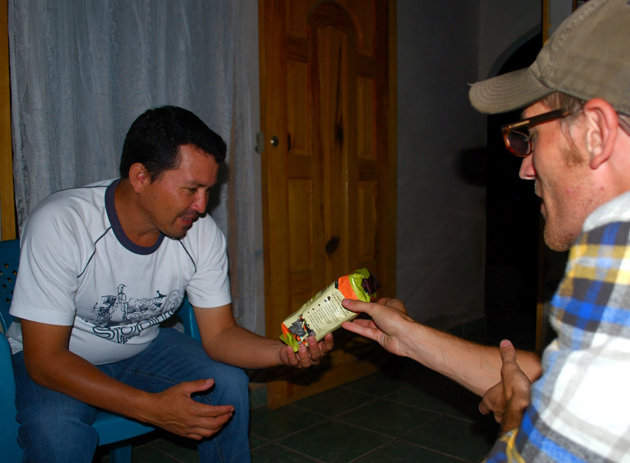
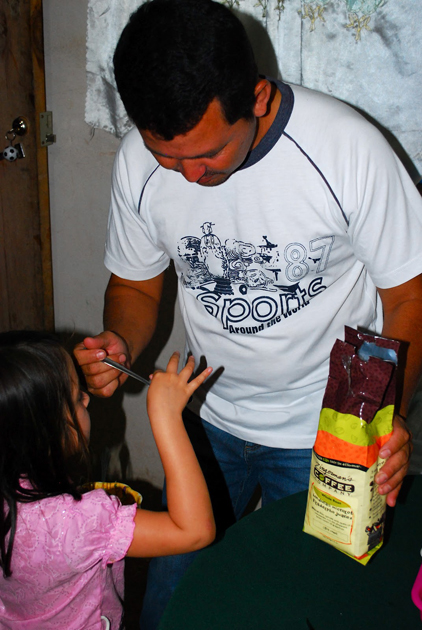
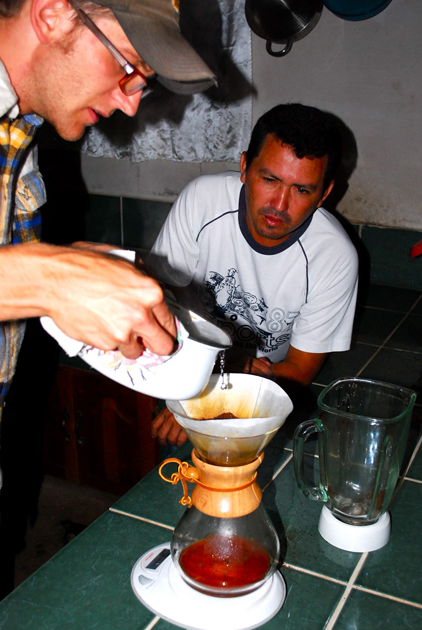
Fito is first. He sips carefully and smiles, and then we give his wife the next cup. Our cups come next. I ask Fito what he thinks his coffee tastes like. Before he responds, his wife claims in surprise that the coffee isn’t bitter at all, that it’s remarkably smooth. We all agree. We acknowledge the floral hint of honeysuckle, giving the coffee a delicate sweetness. And then we turn to Fito for his response.“
Well, this isn’t café de bolsa.” Fito is chuckling, and we are too.
We stand around the kitchen, savoring what is surely the best coffee this household has ever had. We review the flavors, the grapefruit, the honeysuckle again, and over and over they mention how unbelievably smooth this coffee is. No sugar needed. We’ll leave the rest of the coffee with Fito, so he and his family can continue to smell it, drink it, display it, enjoy it. I’m glad I tucked his coffee into my suitcase the day before I left; seeing Fito and his family’s reaction to their own coffee, beautifully roasted and packaged and prepared, is a humbling experience.
We settle into the small patio outside, chatting as we sit on plastic chairs. Fito tells us about how he’s going back to work in a week and describes this year’s harvest. Instead of the gradual maturation of his coffee, all of it seems to have matured at once. While that means he gets to pick almost all of his coffee before returning to work, if rain comes in and delays coffee picking, his livelihood could be destroyed in a matter of days.
The fragility of it all strikes me. It’s especially powerful to process while I’m sitting in Fito’s house, accepting coffee and fresh watermelon from his wife, watching his children play, realizing that much of this situation would be different and could be different due to a few days of rain, sun, or any other small and uncontrollable circumstance. Fito’s hopeful that the weather will hold out. He’s especially excited, too, because he claims that this year’s harvest is going to be even better than last year’s. I think of the amazing coffee we just shared with him and imagine the possibility.
I cannot wait for my next cup of coffee with Filadelfo Juarez.
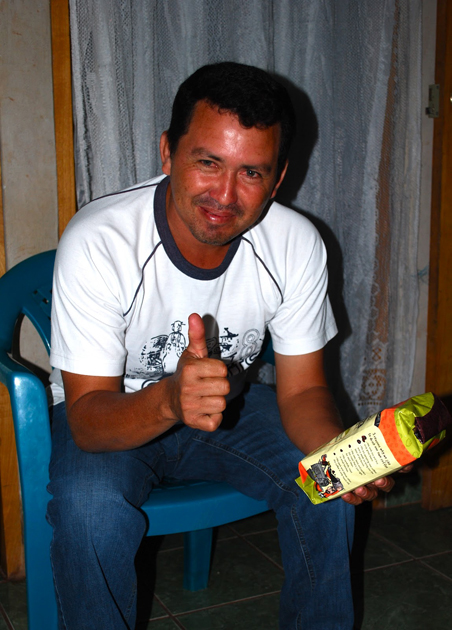
Watch the video here.


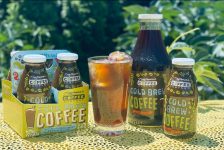
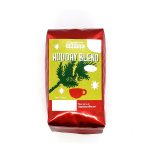
Zingerman’s Art for Sale